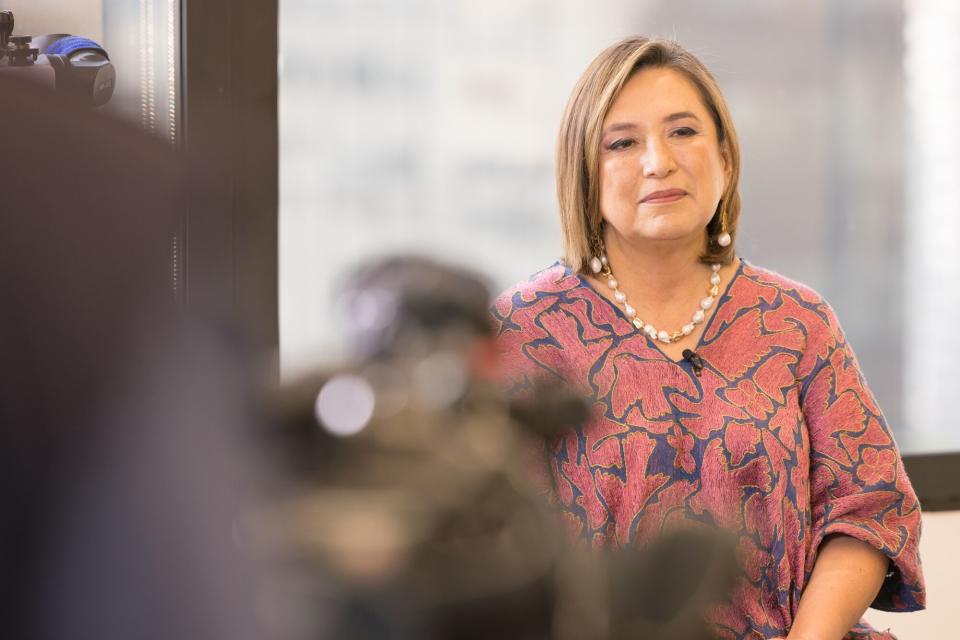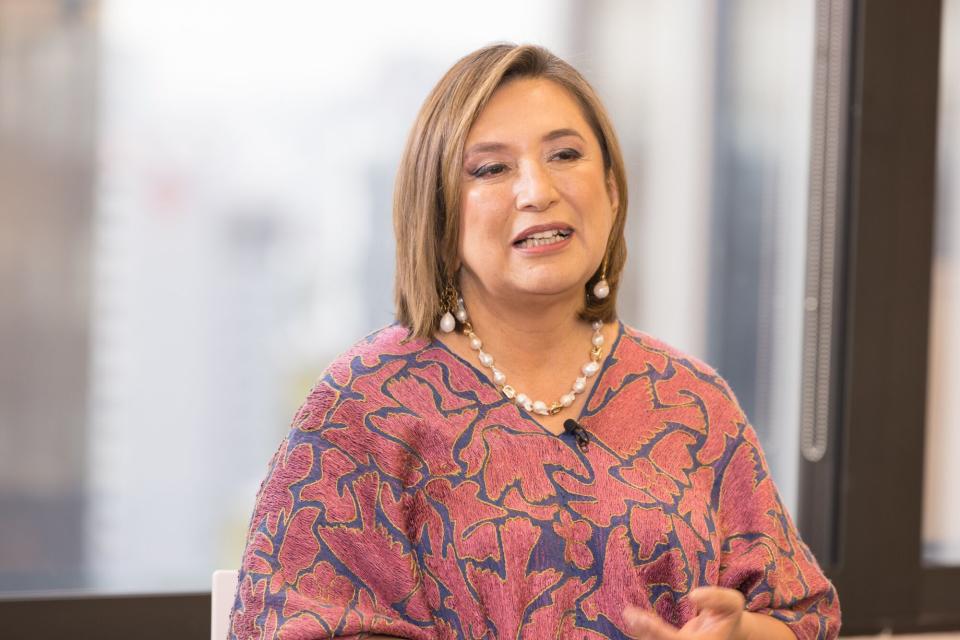Mexico’s Xochitl Galvez on Nearshoring, Insecurity, Donald Trump
(Bloomberg) -- Senator Xochitl Galvez, a top contender for Mexico’s presidency next year, sat down with the team of Bloomberg News in Mexico City on Thursday for a 33-minute video interview. During the conversation, Galvez talked about her proposals for Latin America’s second-largest economy, including nearshoring, insecurity and relations with the US and China.
Most Read from Bloomberg
Everything Apple Plans to Show on Sept. 12: iPhone 15, Watches, AirPods
US Probes Made-in-China Chip as Tensions Flare Over Technology
Hong Kong to Ease Shutdown After Record Rain Overwhelms City
Apple’s 2-Day Slide Nears $200 Billion on China IPhone Curbs
Watch the full interview with Galvez in Spanish on YouTube | Bloomberg en Español
Here are highlights from the interview:
NEARSHORING
Galvez said the trend of companies relocating from China or other far-flung countries to Mexico to serve the US market, known as nearshoring, is “an opportunity that we won’t have again for many decades.” The next government should “immediately” focus on several key things to promote it, according to Galvez: promote the rule of law; boost energy supply; resolve the country’s water shortages; bet on human capital and training of workers; and invest in infrastructure.
Galvez sees nearshoring as a vehicle to promote upward social mobility by generating better jobs for poor Mexicans.
“All these companies require a very specific expertise, so we have to work on that human capital,” Galvez said. “There are thousands of Mexicans that want to move forward.”
POLITICS & PRESIDENTIAL CAMPAIGN
Galvez said she isn’t worried about polls showing she trails her main rival, ruling party candidate Claudia Sheinbaum, by 9 to 17 percentage points. She said she has a history of making up ground on the campaign trail.
“I am a contender who knows how to come from behind, who knows how to fight, who never gives up, who always fought against everything,” she said. “It was never easy for me.”
INSECURITY
The senator said Mexico is suffering from “brutal violence,” with several parts of the country under siege by criminal gangs, and President Andres Manuel Lopez Obrador has failed to acknowledge the problem and face it with empathy.
“The first thing we need is an intelligent strategy,” Galvez said, adding that the government should spend more on local police and working with the US on fighting drug trafficking and arms smuggling. “I’d like to work on a possible agreement on the topic of security and energy with the US.”
At the same time, Galvez rejected the notion that the heavy-handed model followed by El Salvador President Nayib Bukele could be an option for Mexico. Bukele has won popularity by jailing thousands of people authorities suspect of gang activity, but activists and families have decried a lack of due process and respect for civil rights in the arrests. “It’s extreme,” Galvez said of Bukele’s tactics. “You can be firm without violating human rights.”
Galvez also said she would put Mexico’s national guard under civilian control and drastically reduced the presence of the military in the country’s public life. “I don’t see a national guard under military command; I see a national police with a civilian command well-trained and the military has other, different faculties established in the constitution.”
MEXICO CITY AIRSPACE
Galvez would explore the possibility of addressing constraints on the growth of Mexico City’s main airport, called Benito Juarez, by using partially built runways meant for a canceled airport project in the suburbs. She said she’d examine how far along the runways’ construction had come before Lopez Obrador abandoned the project in Texcoco, and whether there could be a way to connect the two airports.
“It could be a little bit like Barajas,” referring to the airport in Madrid, Spain. The Benito Juarez airport and the canceled Texcoco project are about 18 kilometers (11 miles) from each other. Lopez Obrador opted instead to build a new airport about 40 kilometers away from Benito Juarez, and Galvez said she’d need to study how best to use it.
PEMEX & ENERGY POLICY
If elected, the opposition candidate wants to undertake a sweeping reform of state oil firm Pemex, opening the energy sector to private investment and supercharging renewables. While Galvez didn’t commit to privatizing the company, she said a model like Brazil’s Petrobras, which is publicly traded, could work for the indebted state-owned producer. Mexico doesn’t have the resources on its own to transform its energy sector and economy, and private investment should be welcomed to accelerate development responsibly, she said.
“We have a very serious problem, which is that state companies are terrible at managing Mexicans’ money and they’re terrible at being productive. So, yes, I do look toward the private sector,” she said, adding that she’d like to reopen oil bidding rounds that the statist president stopped after taking office in 2018. “I don’t understand why the president hate the privates.”
Read More: Mexico Presidential Contender Wants Sweeping Energy Reforms
FISCAL POLICY
Galvez proposes to stop spending resources on big projects that are very expensive and don’t make sense technically. She cited the airport Lopez Obrador opted to build, along with Pemex’s Dos Bocas refinery and a train across the Mayan peninsula, as initiatives that weren’t well founded.
Making richer Mexicans pay more while giving poorer citizens opportunities to grow in their careers would be her preferred mix of policy to increase fiscal revenue, she said. But people should understand where their taxes are going, she said. “We have to spend the money well before anything else,” she said.
In a discussion with reporters off camera, Galvez said Mexico would fare better with a weaker peso against the dollar, to boost exports, she said. The central bank should cut interest rates to encourage investment, she said.
Read more: Mexico Presidential Candidate Wants Weaker Peso to Boost Economy
DONALD TRUMP
Asked on how she would relate to Donald Trump in case both presidential aspirants win next year’s elections in the US and Mexico, Galvez said their shared background as businesspeople would be the basis to arrive at a “win-win” situation for both countries.
“Donald Trump will be happy with me because he will find a practical woman. What worries him the most is immigration, right? So we could make an agreement for an orderly temporary migration,” she said. “The Republican states need labor for the fields. The Democratic states need workforces for industry, so they have a deficit.”
The senator also said that the US should acknowledge it needs migrants to sustain labor demand, and recognized that many migrants are entering the country without documentation. “As long as there is demand in the market, they will cross,” she said.
CHINA AND US RIVALRY
Galvez made it clear her priority in terms of international politics is the US, Mexico’s largest trade partner by far, and that she doesn’t see the need to court China as an alternative.
“We need to have a dialogue with China, but for me, the priority is where Mexico is located. Mexico is part of North America,” she said. “There is a bipolar world today, because China is on one pole and on the other pole there is the US — that’s the reality.”
“I know where I am located and I do know with whom I want to have a commercial relationship,” she said. “This relationship with the US will be very important to me because that’s reality.”
CUBA, NICARAGUA, VENEZUELA
Galvez pledged to followed a values-based foreign policy and condemn countries including Cuba, Nicaragua and Venezuela that have stifled dissent and democratic rule. “My values are with democracy, with democratic countries and with countries that protect human rights.” That’s a departure from Lopez Obrador, who has had warmer relations with all three nations.
She nevertheless said she is against embargoes and unilateral sanctions against these countries because they end up hurting their people and not necessarily their governments.
RUSSIA-UKRAINE
Galvez said Russia’s invasion of Ukraine should be strongly condemned: “This is not a war — Russia invaded Ukraine.” Under Lopez Obrador, Mexico has also denounced the invasion. But the country hasn’t participated in sanctions against Russia, and the president has criticized NATO for supplying weapons to Ukraine.
--With assistance from Maya Averbuch, Max de Haldevang and Andrea Navarro.
Most Read from Bloomberg Businessweek
Huawei’s Surprise Phone Gives Ammo to Biden Doubters on China
Lyme Disease Has Exploded, and a New Vaccine Is (Almost) Here
©2023 Bloomberg L.P.

 Yahoo News
Yahoo News 



